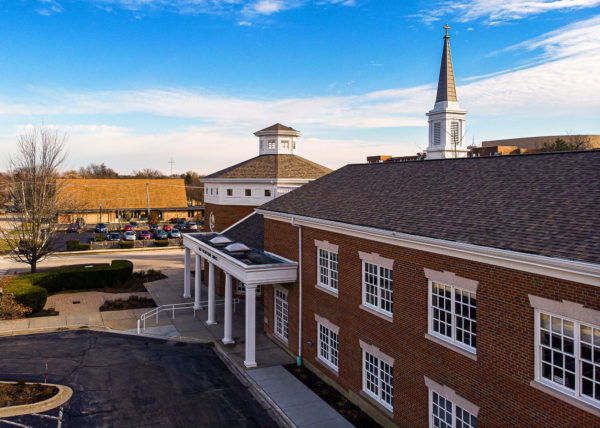“The time is fulfilled, and the kingdom of God has come near; repent, and believe in the good news.”
Mark 1:15
During my junior year of college, I was studying at Oxford University in England. Oxford works on a trimester system. Each trimester lasts eight weeks and then there is a three-week recess. During the first recess, I flew back to Virginia for Christmas. During the second, I had to make a choice—go home for three weeks or stay at Oxford and work as a waiter in the large banquet hall located in my residential college.
I had never worked in a restaurant before. My primary source of income up until that point was mowing lawns and coaching for various swim teams. My friend who was staying over the break convinced me to stay and work. This was not your traditional restaurant. During these three-week periods, my college at Oxford would host conferences. Hundreds of people would pack into our college and we served them breakfast, lunch, and dinner. Breakfast and lunch were relatively simple affairs. Dinner is where things got crazy. Five course meals. Wine service. The male servers were expected to wear tuxedos.
Although we would get short breaks in-between meals, we worked 12-hour days. By the end of the three weeks, I was exhausted. Then I got my pay stub—I took home about £667 British pounds. This was 2001 and, at the time, based on the conversion rate, that translated into about $1000. For a kid who was used to making fairly modest sums of money, it felt like I had amassed a small fortune. I called my friend back in the United States who worked in a restaurant and asked if what I received was normal pay for servers. He said, “No way! I’m lucky if I bring home a $1000 in a month. It’s barely enough to pay my rent and food.”
This is when I started looking into the difference between the way American and British restaurants function. I think everyone reading this is aware of the way that American restaurants work. You order your food and provide a tip to the server based on a percentage of your bill and the quality of the service you received. On top of these tips, servers are paid anywhere from $2.13 an hour to $14 an hour depending on the state in which you live. Therefore, if you’re on the lower end of that spectrum and you don’t get any customers in your restaurant, you could feasibly only bring in $17.04 for an 8-hour day.
In England, you do not tip your servers. Unlike in the United States where being a server is often a transitional job, being a server is considered a career. They are paid a flat per hour wage or a salary, which is required by law to increase with inflation rates. In other words, if you are a server and work eight hours a day, you know exactly what you are bringing home and you can afford to live off that money.
I started having discussions with the professional servers I worked with and I asked them about their lives, specifically, if they were able to make ends meet. They all said the same thing: “We’re not living the high life, but we’re not living in poverty either. It’s a good job and it gives my family a good life.” Since they knew I was an American, they were also quick to point out that they don’t have to pay extra for health insurance. Universal health care is already figured into their taxes.
Many of them had hopes that their children might one day be able to attend Oxford, arguably one of the best universities in the world. Getting into Oxford is completely merit based. If you get a high enough score on the entrance exams, you can get in. By the way, the cost of tuition to attend Oxford in 2001 for one year was £1200 or about $1700. By the time you’re finished at Oxford, even if you must take out a loan, the cost is under £5000 for your entire education as opposed to $50,000 or more for American colleges and universities.
Now don’t think I’m telling you all of this because I want you to believe that England is some kind of utopia. It is not. There are many social problems in England and it is known as Treasure Island because consumer goods are so expensive. But one thing their society has gotten right is they have taken significant steps to address issues of inequity.
If you work a job, they want to make sure you can afford to live. If you go to the doctor, they don’t want the hospital bill to bankrupt you. If you seek out higher education, then you shouldn’t have to take out massive loans that will require 30 years to repay.
Interestingly, at the same time I was experiencing this system of equity firsthand, I was studying theology. My professors, who were Catholic monks, informed me that the push to create equity for the people of England was founded in the church. Following World War II, Britain was trying to rebuild, and everyone was suffering. So many people had lost loved ones, their homes, and their livelihood. The British government was looking for ways to ease their burden and, with so many soldiers coming back home with severe injuries, that’s when groups of Christians rallied the government to make universal health care an option.
They pointed to the fact that Jesus tried to ease the burdens of those who were suffering from illness and disease. This argument was the moral backbone to the establishment of the British National Health Service (NHS). From there, notions of equity snowballed into other areas—workers compensation, university tuition rates, etc. I point this out to you because this is part of what inspired me to become a Christian in the first place. I believe dissolving inequity needs to be the top priority of Christians.
The first words that Jesus utters in Mark’s gospel are what we read at the beginning of the devotional: “The time is fulfilled, and the kingdom of God has come near; repent, and believe in the good news.” I’ve spoken about this a lot in the past, but it bears repeating: God’s kingdom is a world where the injustices and inequality experienced by so many are corrected. God’s kingdom is a place where every human has food to eat, clothes to wear, a home in which to live, and medical treatment for their illnesses. In essence, God’s kingdom is a place where no one is forgotten.
The creation of God’s kingdom is our goal as Christians. We are here to be Jesus’ hands and feet in the world and that requires us to stand up and fight for equity and equality wherever we see it lacking. We start by correcting the disparities in our own church community and it snowballs from there. May you find the strength to step up and step out of your comfort zone because this is hard, but necessary work. Just remember without you, the kingdom Jesus envisioned 2000 years ago will never come to fruition!
Pastor Alex



